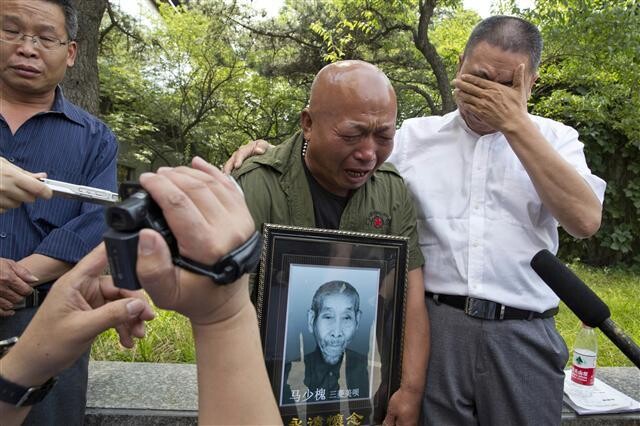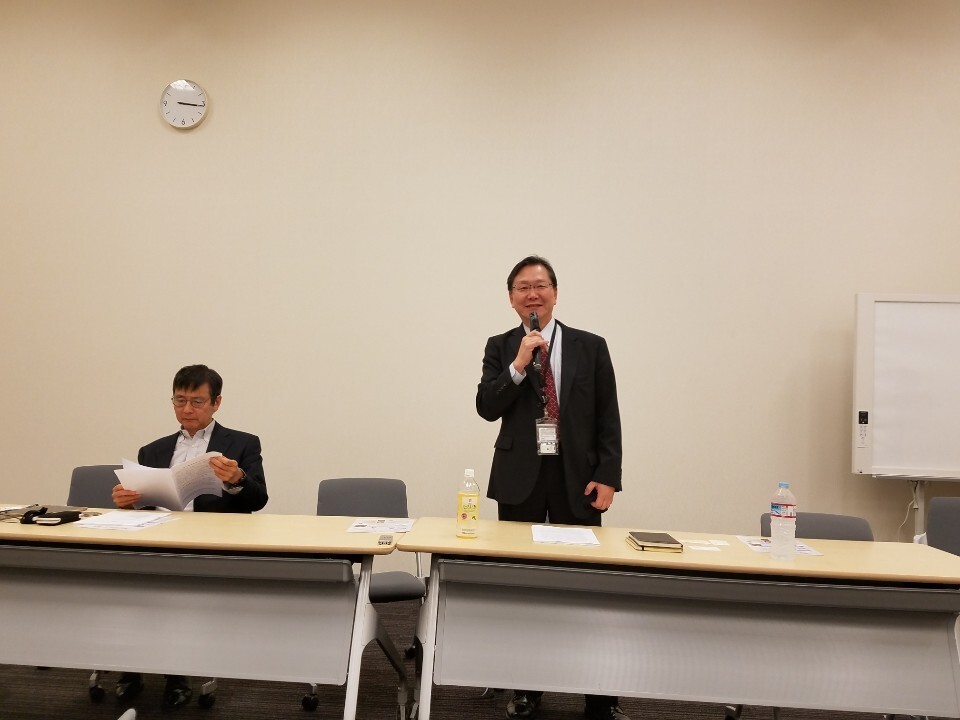hankyoreh
Links to other country sites 다른 나라 사이트 링크
Mitsubishi to establish fund to compensate Chinese victims of forced labor within the year

Japan’s Mitsubishi Materials (formerly Mitsubishi Mining) is planning to set up a fund for Chinese victims of forced labor within the year as part of a settlement reached with those victims, the Japanese press is reporting.
Kyodo News reported on Nov. 5 that Mitsubishi Materials has agreed to create the fund before the end of this year, which marks the 40th anniversary of the signing of the Treaty of Peace and Friendship between Japan and China.
After Chinese victims filed a lawsuit in the Chinese courts in 2014, Mitsubishi Materials announced in June 2016 that it felt “keen remorse” that Chinese had been conscripted into labor during World War II and would pay 100,000 Chinese yuan [US$14,440] per person as evidence of this remorse. The company said it would also create a fund to install a memorial stone, hold memorial services and to track down missing victims or their family members.
The company said that 3,765 individuals would be eligible for the settlement, a figure based on a report about Chinese workers in each workplace that was composed by the Japanese Ministry of Foreign Affairs in 1946. Thus far, only 11 of the victims have received the settlement.
Mitsubishi Materials has had difficulties paying the money because it was uncertain whether the surviving family members were the heirs to the victims’ property, but the organization running the fund should be able to resolve this problem once it comes into being. The fund is supposed to be called the “Fund for Historical Human Rights and Peace.” The company is planning to pay 100 million yen (US$882,300) to build the memorial stone and 200 million yen (US$1.8 million) to look for the missing family members.
The Japanese government’s commitment to improving relations with China appears to be a factor in how quickly the company has moved to pay compensation. Mitsubishi Materials refuses to provide an apology or compensation to Korean victims. But it remains to be seen whether the company will be able to finalize its settlement with the Chinese as planned. Several of the victims’ families are planning to continue their lawsuit.
The position of the Japanese government and companies that Chinese can be compensated but Koreans cannot is based not only on the 1965 agreement between Japan and South Korea that settled outstanding claims but also on the fact that Korean workers were conscripted in accordance with laws during the colonial period, whereas China had been invaded by Japan.

But 93 Japanese attorneys released a statement on Nov. 5 in which they directly criticized the attitude of the Japanese government under Prime Minister Shinzo Abe that the harm caused by the forced labor was completely and finally resolved by the 1965 agreement.
“The issue of the conscript workers is fundamentally an issue of human rights, so an intergovernmental agreement that’s unacceptable to the victims cannot be a true solution,” the attorneys said in their statement about the South Korean Supreme Court’s ruling on the conscript workers. The attorneys also said what the 1965 agreement had caused to lapse was not the individual right to make claims but the state’s right to diplomatic protection and that such a position is not at variance with international standards.
The statement also said that the Japanese government ought to help its companies resolve the issue of Korean conscript workers instead of blocking them from doing so and cited the example of Mitsubishi Materials taking steps to apologize and provide a remedy to former Chinese workers.
“As an attorney, I’ve felt that the one-sided bashing of South Korea in the Japanese media after the South Korean Supreme Court’s judgment was out of place. I asked people to take part [in the statement] since Nov. 4, and a lot of people got on board despite the short period of time. Prime Minister Abe said that the South Korean Supreme Court’s ruling was absurd in light of international law, but that very statement itself is absurd,” said attorney Siro Kawakami, who spearheaded the statement that was released.
By Cho Ki-weon, Tokyo correspondent
Please direct comments or questions to [english@hani.co.kr]

Editorial・opinion
![[Editorial] Intensifying US-China rivalry means Seoul must address uncertainty with Beijing sooner than later [Editorial] Intensifying US-China rivalry means Seoul must address uncertainty with Beijing sooner than later](https://flexible.img.hani.co.kr/flexible/normal/500/300/imgdb/original/2024/0517/8117159322045222.jpg) [Editorial] Intensifying US-China rivalry means Seoul must address uncertainty with Beijing sooner than later
[Editorial] Intensifying US-China rivalry means Seoul must address uncertainty with Beijing sooner than later![[Column] When ‘fairness’ means hate and violence [Column] When ‘fairness’ means hate and violence](https://flexible.img.hani.co.kr/flexible/normal/500/300/imgdb/original/2024/0516/7417158465908824.jpg) [Column] When ‘fairness’ means hate and violence
[Column] When ‘fairness’ means hate and violence- [Editorial] Yoon must stop abusing authority to shield himself from investigation
- [Column] US troop withdrawal from Korea could be the Acheson Line all over
- [Column] How to win back readers who’ve turned to YouTube for news
- [Column] Welcome to the president’s pity party
- [Editorial] Korea must respond firmly to Japan’s attempt to usurp Line
- [Editorial] Transfers of prosecutors investigating Korea’s first lady send chilling message
- [Column] Will Seoul’s ties with Moscow really recover on their own?
- [Column] Samsung’s ‘lost decade’ and Lee Jae-yong’s mismatched chopsticks
Most viewed articles
- 1[Editorial] Transfers of prosecutors investigating Korea’s first lady send chilling message
- 2[Exclusive] Unearthed memo suggests Gwangju Uprising missing may have been cremated
- 3[Column] US troop withdrawal from Korea could be the Acheson Line all over
- 4‘Shot, stabbed, piled on a truck’: Mystery of missing dead at Gwangju Prison
- 5S. Korea “monitoring developments” after report of secret Chinese police station in Seoul
- 6[Column] When ‘fairness’ means hate and violence
- 7[Editorial] Intensifying US-China rivalry means Seoul must address uncertainty with Beijing sooner t
- 8US has always pulled troops from Korea unilaterally — is Yoon prepared for it to happen again?
- 9[Column] How to win back readers who’ve turned to YouTube for news
- 10Xi, Putin ‘oppose acts of military intimidation’ against N. Korea by US in joint statement